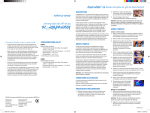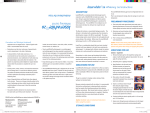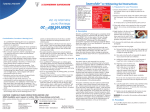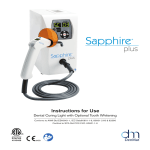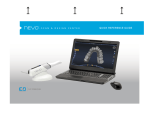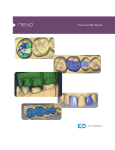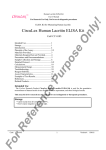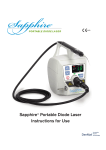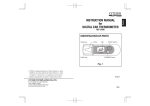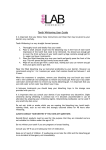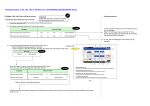Download Whitening Gel Kit Instructions for Use
Transcript
Whitening Gel Instructions Instructions for Use Whitening Gel Kit Precautions and Warnings (continued) KIT CONFIGURATIONS • The patient should be advised not to consume products 7400030 Contains 5-pack of each: • Tooth Whitening Gel, Base, 45% Hydrogen Peroxide – 1 syr, 1.0 mL • Tooth Whitening Gel, Activator – 1 syr, 0.2 mL • Liquid Dam – 1 syr, 1.2 mL • Desensitizer – 1 syr, 1.2 mL * This kit is not for sale in Canada. that stain teeth up to 48 hours after treatment. This would include, but not be limited to, some fruits, coffee, red wine, tomato sauces, tea, tobacco, etc. • Since LaserWhite20 whitening gel is an oxidizing agent and oxidizing agents have been reported to potentiate the action of some carcinogens, it is recommended that patients discontinue the use of tobacco and alcohol containing products prior to the use of this whitening system and during any part of the whitening procedure. • Keep whitening gel out of the reach of children. Ensure that whitening gel is not accessible by children or unqualified personnel. • The LaserWhite20 whitening gel is designed only for use with BIOLASE diode laser systems. DO NOT use this gel with any other delivery systems, lasers or light sources. LaserWhite20 whitening gel when used with other lasers or light sources may result in damage to the light source and adverse effects to the patient may occur. 7400063 Contains 5-pack of each: • Tooth Whitening Gel, Base, 45% Hydrogen Peroxide – 1 syr, 1.0 mL • Tooth Whitening Gel, Activator – 1 syr, 0.2 mL • Liquid Dam – 1 syr, 1.2 mL DESCRIPTION 2. Determine and record baseline shade. LaserWhite20 is a proprietary dental whitening gel used in conjunction with a BIOLASE 940 nm diode laser system. The laser, through a specialized handpiece and delivery system, activates the LaserWhite20 whitening gel to accelerate the whitening process. 3. Prior to mixing, bring LaserWhite20 to room temperature. The Base Gel contains a 45% concentrated hydrogen peroxide as an active incredient. The Activator is formulated with a proprietary dye that activates by absorbing laser energy in the 940 nm wavelength. The unique mixing syringe system ensures freshness for each application and precise dosing of the activator. When mixed, the LaserWhite20 whitening gel results in a 35% hydrogen peroxide. Liquid Dam is a methacrylate-based light cured resin intended to protect soft tissue adjacent to the teeth from contacting the whitening gel. It is designed with sufficient strength to maintain a barrier yet is easily removed from embrasures and undercuts. INDICATIONS FOR USE LaserWhite20 whitening gel is indicated for medical in-office use only by a dental professional in conjunction with a BIOLASE laser system with a wavelength of 940 nm for single tooth, partial or full-arch whitening. The gel is a solution for treating surface staining of dark, yellowed, or discolored teeth caused by disease, injury, or other medical treatments. Because restorative materials will not whiten, it is recommended that teeth are whitened prior to placing esthetic restorations (wait two weeks after bleaching procedures before placing adhesive restorations). Most treated teeth continue to whiten 12 to 24 hours after whitening treatment is completed. Bleaching problematic teeth to a more natural shade will optimize restorative matching. Caution: Avoid contact of the product with the eyes or skin. Patient, clinician and assistant must wear protective eyewear and gloves when mixing and applying this product. DIRECTIONS FOR USE Isolation – Liquid Dam 1. Remove the black cap from the Liquid Dam syringe and replace it with the black applicator tip provided. Be sure to apply the syringe tip firmly. 2. Verify flow prior to applying intraorally. 3. Apply Vaseline to the lips and insert lip/cheek retractors to expose the treatment area and to keep any soft tissue away from the teeth. Cotton rolls are recommended for increased protection and patient comfort. 4. Rinse and air dry teeth thoroughly, especially the gingival tissue around the teeth to be whitened. 5. Express a continuous bead of Liquid Dam along the gingival margin, overlapping approximately 0.5 mm onto the enamel. Begin and finish the bead one tooth beyond the most distal tooth that is being bleached and cover any exposed root surfaces. 6. Continue building the barrier apically until it is 4-6 mm high and 1.5-2.0 mm thick. 7. Express resin through any open embrasures onto the lingual tissue completely sealing and covering exposed papilla. Caution: Carefully read and understand instructions before using this product. 8. Using a mouth mirror, look up the long axis of the teeth and STORAGE CONDITIONS 9. Light-cure 20 seconds per arch using a The LaserWhite20 whitening gel must be refrigerated when not in use. Prior to use (component mixing), allow the syringes to reach room temperature. BIOLASE and the LaserWhite20 logo are registered trademarks of BIOLASE, Inc. PRELIMINARY PROCEDURES Manufactured for: EU Representative: 1. Clean and polish teeth approximately two weeks prior to BIOLASE, Inc. 4 Cromwell Irvine, CA 92618 USA 888-4-BIOLASE MT Promedt Consulting GmbH Altenhofstrasse 80 D-66386 St. Ingbert Germany 5400524 Rev D.indd 1 Use photographs when indicated for baseline documentation. bleaching appointment to remove any subgingival calculus. Surface plaque and stains should be removed with pumice. re-apply to any minute openings. scanning motion. Carefully check resin cure with an instrument. Mixing LaserWhite20 1. Remove the caps from both the whitening gel activator and base syringes. Connect the two syringes together by twisting one syringe onto the other until fully tightened. Caution: If not fully tightened, gel may leak out during the mixing process. 2. Depress the plunger forcing the contents of the base syringe (clear contents) into the activator syringe (purple contents). 5400524 Rev D 11/25/2014 9:25:41 AM 3. Continue depressing the activator syringe until all gel is in the base syringe. 4. Reverse the action and mix a minimum of 25 times (12-13 times on each side). Make sure the gel is consistent throughout the syringe, continue mixing if necessary. 5. Press all mixed gel into the whitening gel base syringe. 6. Twist to separate the two syringes and attach the brushed applicator tip onto the base syringe. Applying LaserWhite20 1. In one office visit, the clinician can perform a maximum of two (2) gel applications. 2. Divide the upper and lower arches into four treatment sites. Each treatment site can consist of as many as 5 teeth: Q1 Upper right quadrant (4-8; EU: 11-15) Q2 Upper Left quadrant (9-13, EU: 21-25) Q3 Lower right quadrant (25-29, EU: 41-45) Q4 Lower left quadrant (20-24, EU: 31-35) NOTE: The whitening handpiece is designed to treat a full quadrant (4-5 teeth) at a time. 3. On gauze or mixing pad, verify flow of syringe prior to applying intraorally. If resistance is met, replace tip and re-check. Use only recommended tips. The gel should spread on teeth without dripping or running. 4. Dry the teeth by wiping them with gauze. 5. Apply a thin layer of LaserWhite20 whitening gel over all four quadrants. The gel should be evenly spread with the brushed applicator tip to about 1mm thickness. To confirm the uniform thickness, observe the consistency of the lavender color within the gel. Caution: Avoid direct contact of the active surface of the tooth whitening product with the gums, lips and/or salivary flow. Additionally, take adequate precaution to ensure that the patient does not swallow any whitening gel. 6. Place a disposable protective shield over the arch of the handpiece. The disposable shield is for single-use only to avoid cross-contamination. Dispose of the protective shield when treatment session is completed. NOTE: Damage to the whitening handpiece may result if the disposable protective shield is not used, should it inadvertently contact the whitening gel. WARNING: Ensure that the doctor, patient and assistants are wearing protective eye wear before starting the laser treatment. The eye wear received with the system is specially designed for the respective laser. DO NOT use any other protective eye wear. WARNING: If at any time during the LaserWhite20 process the patient experiences discomfort or sensitivity, stop the procedure, carefully remove the gel and irrigate over the entire area with copious quantities of water while using high-speed suction. Apply wet cotton gauze over the same area and wait for a few minutes before proceeding. DO NOT proceed with treatment if sensitivity continues. If irritation (such as redness, swelling, soreness) of the gums or the mouth occurs, discontinue use. 7. Prepare the BIOLASE 940 nm laser system as per the User Manual. Connect the whitening handpiece to the fiber shaft and select the teeth whitening mode, a fixed, preset parameter of 7W for 30 seconds. 8. Place the whitening handpiece in close proximity, approximately 1mm to Q1, without contacting the whitening gel. Activate the laser by holding the footswitch down. Hold the handpiece in place for the duration of the 30-second preset treatment. 9. Repeat Step (8) for Q2, Q3 and Q4. 10.Repeat the procedure for all quadrants a second time. NOTE: If patient experiences tooth sensitivity during the procedure or irritation (such as redness, swelling, soreness) of the gums or the mouth occurs, stop the procedure and evaluate the patient’s condition. DO NOT proceed if the sensitivity or irritation continues. 11.Allow the whitening gel to remain on the teeth for a minimum of 5 minutes after the second laser cycle (Step 10). 12.Remove the gel using high-speed suction, and then flush with an air and water spray to remove any residual gel. Be careful not to dislodge the Liquid Dam during this step. 13.Replace the brushed applicator tip with a new one. Reapply the LaserWhite20 whitening gel and perform steps (8) through (12). Clean-up 1. Using a dental instrument, i.e., an explorer or forceps, gently slide the tip beneath the Liquid Dam and lift it off carefully. Check and remove any interproximal remnants by using an explorer or dental floss. Rinse again. TOOTH SENSITIVITY 1. For tooth sensitivity, LaserWhite20 Desensitizer that contains potassium nitrate and sodium fluoride may be used immediately by the dental professional or provided to the patient for home treatment in a custom fabricated tray. Fabricate tray to meet patient’s needs. If patient already has a custom bleaching tray, the Desensitizer may be applied in the same tray and manner as the bleaching gel. 2. While the length of use may vary depending on the condition, the patient, and the dental professional, the recommende length of use is between 15 and 60 minutes. 3. Immediately following tray removal, patient should brush and rinse teeth with water to remove all remaining gel. DO NOT swallow solution during rinsing. Wash tray and store in a tray storage case. Fresh gel should be used with each application. Note: LaserWhite20 Densensitizer not available in Canada. Please use preferred methods to treat tooth sensitivity. CONTRAINDICATIONS • Products containing peroxides are not recommended for use by children under 12 years of age and by pregnant or nursing women. • Patients with periodontal disease, exposed root surfaces, damaged or fissured enamel, gross caries, and allergies to chemical products such as hydrogen peroxide or other similar conditions are not candidates for laser teeth whitening procedures. • LaserWhite20 should NOT be used on any patient with known allergies to hydrogen peroxide, resin-based materials or other such chemicals. Medical clearance from the patient’s physician is advisable when doubt exists regarding treatment. • Do not use Liquid Dam on patients with known sensitivity to methacrylate-based resins. It is advisable to test Liquid Dam on a small section of the patient’s gum, before attempting this procedure. PRECAUTIONS AND WARNINGS • It is required that laser protective eye wear be worn by the patient and any dental personnel in the operatory during the procedure. Office personnel who are not wearing protective eye wear should not enter the operatory while the laser system is in use. The protective eye wear included with the system is specific to the laser’s wavelength and also protects the operator, patient and any dental auxiliary personnel from inadvertent contamination of their eyes with the whitening gel. • Protective gloves must be used throughout the whitening procedure. It should be noted that the whitening material, when in contact with mucosal membranes, or unprotected epidermis, can be caustic and cause irritation and burning. If at any time during the procedure the patient experiences discomfort or burning, stop the procedure. Irrigate the area with copious quantities of water and evacuate excess water with the high-speed suction. DO NOT proceed if the patient continues to experience discomfort, burning sensations or any other sensations that are uncomfortable to the patient. • Patient expectations must be discussed prior to the start of the whitening process. It is recommended to evaluate tooth shade prior to the procedure and again at the conclusion of the treatment. Though it is possible to apply the LaserWhite20 whitening gel for two (2) applications (sessions) per patient visit, the desired results may be achieved in one application. • When curing the Liquid Dam, hold the curing light at least 2 cm away from the resin to reduce any heat-induced sensitivity during curing. • Application on the teeth must be uniform and free from gaps to ensure uniform whitening of teeth surfaces. Monitor patient’s progress during treatment and discontinue use if patient reports sensitivity or discomfort, or if clinical results exceed desired effects for patient and operator. • DO NOT anesthetize the teeth for this procedure. If any sensitivity occurs, discontinue the process as stated above. • Caution must be exercised regarding the inadvertent transferal of whitening gel from gloved hands or dental equipment onto non-target tissues. Copious irrigation with water is recommended when this occurs. • Restorations must be intact, and areas of exposed dentin must be treated prior to the start of whitening. • A rebound effect of tooth shade could occur. It is recommended to wait two weeks prior to placement of proximal restorations, since stabilization of tooth shade may take several days to two weeks after the treatment. The patient may experience positive (lighter) or negative (darker) rebound after this procedure is completed for up to two weeks. • Existing crowns, onlays, veneers, and composite restorations will not change color as a result of this whitening process. The patient and dental professional should discuss possible cosmetic implications that existing restorations pose in whitening cases. • Areas of hypocalcification will bleach faster than adjacent tooth structure. These are not always clinically evident at the onset of whitening and when visible, the gel should be placed carefully adjacent to these areas to blend the remaining surface shade. ©BIOLASE, Inc. All Rights Reserved. 5400524 Rev D.indd 2 11/25/2014 9:25:48 AM


